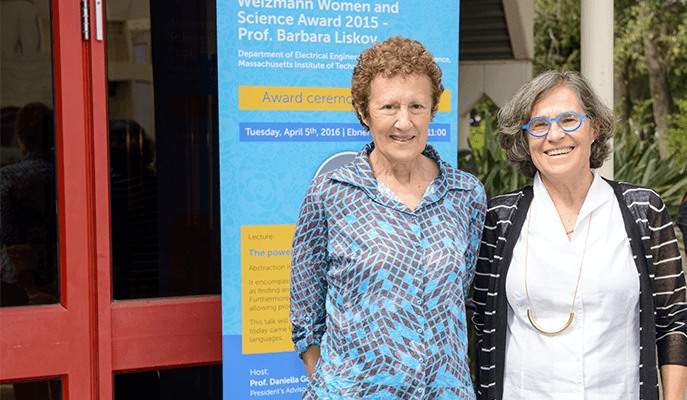Are you a journalist? Please sign up here for our press releases
Subscribe to our monthly newsletter:
“In 1972, when I joined MIT, there was a faculty of 1,000. Ten of those were women,” said Prof. Barbara Liskov at the Weizmann Women and Science Award ceremony. “My husband and I attended a reception for new faculty that fall, and the chairman of the board walked up to us, turned to my husband and said, ‘Welcome to MIT, Prof. Liskov!’ You can imagine the embarrassment that ensued when his mistake became apparent. But I have witnessed this same attitude much more recently.”

Prof. Liskov has received numerous prizes and honors, including the John von Neumann Medal and the Turing Award, for her critical contributions to the theoretical and practical foundations of modern programming languages and system design.
In her talk, Liskov described her career path, beginning with studies at the University of California, Berkeley, in 1957. There, she realized she had a flair for mathematics, and changed her major from physics to math. Afterward, in 1961, she applied to Princeton University for graduate studies but was turned down because she is a woman. “They informed me by postcard that they did not accept women. It was not personal; it was completely impersonal,” she said.
Although she had been accepted to other programs, Liskov decided to look for work in math and landed a job as a programmer. “I didn’t even know computers existed,” she said. “In those days, companies would take people with no programming experience. Computer science was not yet an academic field.” She was handed a book on the programming language FORTRAN, and her love affair with computers began.
In those days, companies would take people with no programming experience
The self-taught Liskov went on to work on MITRE, a not-for-profit organization that managed research and development for US government agencies, and then she headed a translation project for Harvard University. Eventually she returned to studies at Stanford University, where she worked on artificial intelligence. She is now an institute professor at the Massachusetts Institute of Technology.
Although she had a hand in conceptualizing and developing much of today’s computer programming language, Liskov professes to be surprised at the extent to which computers have taken over: “In the '60s and '70s," she says, “it was just an interesting field to be in. I saw that computers could affect government, but I could not have predicted the information revolution, that everyone would have a computer in their home and that they would communicate through a global network. Back then, for most people, computers were still a mystery.”